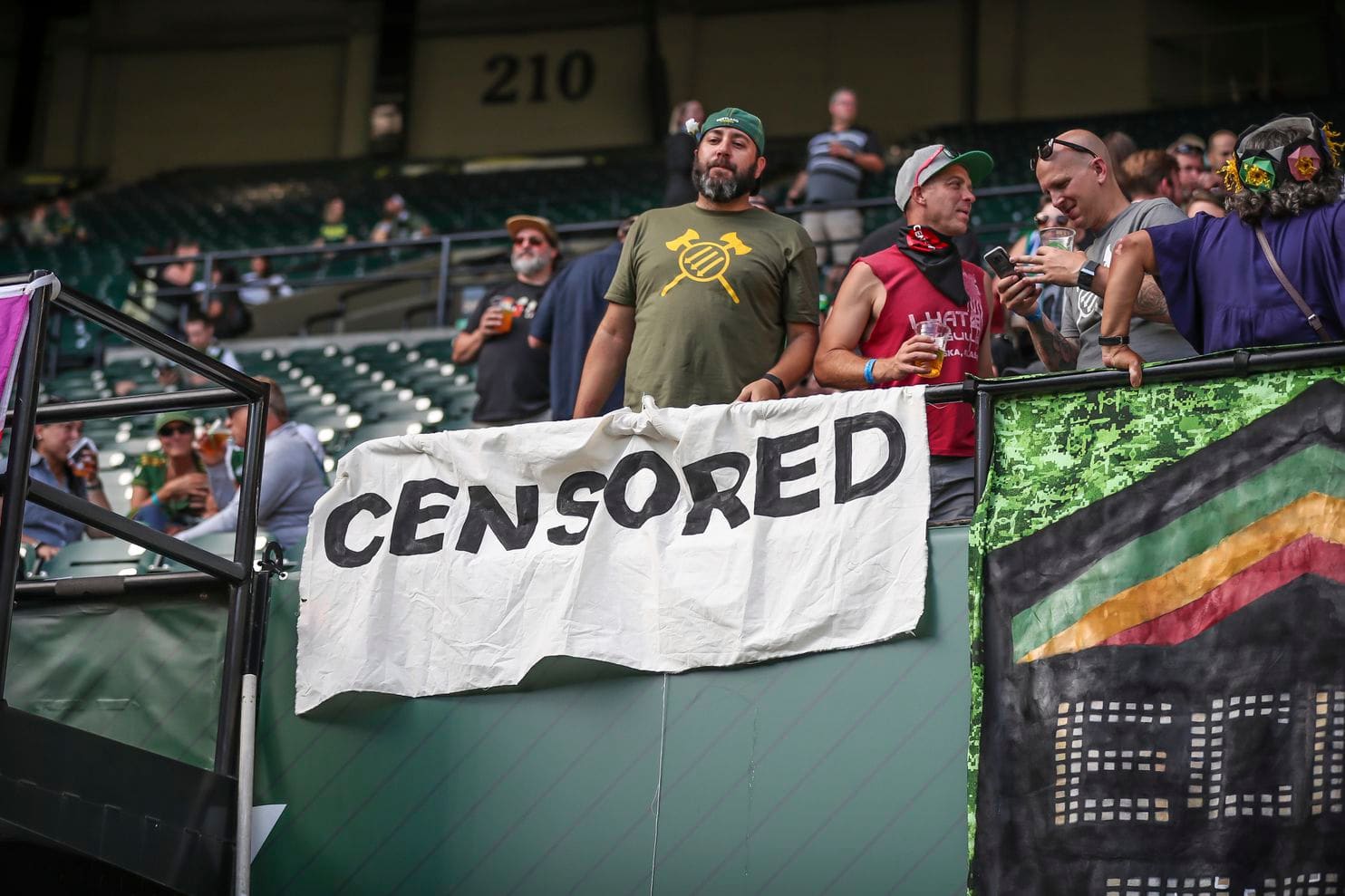
This article from partner site Six Votes Down
On Friday night, as the Portland Timbers played the Seattle Sounders in America’s best soccer rivalry, their supporters groups made headlines across the country – for an unprecedented joint protest.
For the first half hour of the game, both Timbers and Sounders fans, normally fell silent in protest of Major League Soccer’s (MLS) Fan Code of Conduct.
The code, installed before the start of the current MLS season in March, bans “using (including on any sign or other visible representation) political, threatening, abusive, insulting, offensive language and/or gestures, which includes racist, homophobic, xenophobic, sexist or otherwise inappropriate language or behavior.”
To the uninitiated, this might seem innocuous. But the policy allows the league to label anything it dislikes as “political” – thereby arbitrarily censoring the banners, flags, and clothing fans bring and wear to matches.
MLS has targeted one symbol in particular for removal from its stadiums: the anti-fascist Iron Front, which was originally used by a collection of leftists, socialists, anarchists, and communists to resist the Nazis in Germany in the 1930s.
Now, the Iron Front signals opposition to discrimination in any form. To their immense credit, Timbers and Sounders supporters have for yearsdisplayed it at matches to illustrate their anti-racist and anti-fascist positions while trying to create an atmosphere of radical inclusion in their stadiums.
That effort attempts to speak specifically to people from marginalized communities to say that, not only tolerated or accepted within these respective supporters’ groups and stadiums, but they are welcomed, celebrated, and, most importantly, safe.
The Iron Front says, essentially, that anyone except fascists and racists are welcome.
But with this new fan code of conduct, MLS has decided that the Iron Front is “political”, because has been associated with “Antifa,” and is thus banned.
There can be no arguing, however, that the ban on politics in stadiums is absolute. Supporters are still allowed to display pride flags, the league can promote anti-racism in an advertising campaign, and Alejandro Bedoya can tell Congress to end gun violence and face no punishment.
How? MLS is attempting to draw a distinction between “politics” and “human rights” – political expression is not allowed, but expressions of support for human rights are.
That MLS is trying to draw this distinction is problematic not only because of the contradiction inherent in it – human rights issues are and always will be connected to politics – but because MLS is using it cynically to shut down any advocacy that makes it uncomfortable.
A critical aspect of any human rights-related work is building communities and spaces that embody the values of inclusion and respect.
Not only do Timbers and Sounders supporters do remarkable work in their cities fighting for justice and equity, but when they come together they also build an intentional community where people from marginalized communities are not just tolerated, but accepted and welcomed.
Make no mistake, that is itself human rights work. Every action that makes someone feel welcomed and supported – from something as simple as a smile to singing an anti-fascist anthem, as Timbers supporters did when they broke their silence last Friday – is human rights work.
That work is also political, because we live in a country that does not respect human rights. For people in marginalized communities in the United States, merely existing is political.
Ever since since the term “human rights” was coined in the wake of the Holocaust, people fighting for human rights have been under attack. Just because there is a Universal Declaration of Human Rights doesn’t mean that countries actually follow it.
We only need to look to our southern border, where human beings are routinely denied their right to seek asylum, protected by international law and Article 14 of the Universal Declaration of Human Rights.
Human rights were devised as something that would serve as the ultimate protection for marginalized communities, because they would exist above political decision-making. But that admittedly laudable goal fails to recognize the world that we live in.
When asked at the MLS All-Star game several weeks to explain how the league draws a distinction between human rights and politics, Commissioner Don Garber gave a response that sounded incoherent.
Garber said that the fan code is a “very strict policy that we don’t allow political signage, and it’s not a question of judgement about which group is right and which group is wrong, which group we should support or not support.”
He went on to say that a rainbow flag “is not a political statement,” and that “it’s very hard for me to respond to those kinds of things” when asked whether a Make America Great Again hat is political.
As ludicrous as the idea that a hat in support of the President of the United States could somehow not be political is, it isn’t the most absurd thing Garber said in the interview.
He also declared the Iron Front “a political organization,” which is true in the sense that it existed in the 1930s until it was banned and its members persecuted by Nazi Germany.
Consider, though, another political organization that fought Nazi Germany shortly after the Iron Front: the United States military, an organization that MLS supports through Military Appreciation and Armed Forces nights, as well as every time they play the national anthem before a game and take Department of Defense money to do so.
This intellectual dishonesty about what is and isn’t political may easily have extended to gun violence had Alejandro Bedoya not addressed it on the field in such a public – and popular – way that MLS couldn’t punish him.
Yet Bedoya’s protest did not stop Atlanta United from kicking fans out of a match, and banning several for varying lengths, for displaying a banner that says “End Gun Violence.”
The league’s other two big human rights causes, anti-racism and LGBTQ+ rights, can’t be viewed without looking at what the league gains from its support.
Backing pride nights and selling pride-themed merchandise is a business decision. MLS can sell pride merchandise and say “Soccer For All” because some 63 percent of Americans – thanks in large part to the dedicated political activism of so many.
For MLS, this is just business. For the league’s supporters, it’s something more.
It’s worth noting that some in the league and some of the pundits employed by the league’s official broadcast partners, Alexi Lalas most notably, have defended the ban on the grounds that some fans want to go to a stadium and think about anything other than politics – an argument that stems from the extraordinary privileged understanding of the world that says a person can, in some way, go through their life without thinking about politics.
While many white men have long had that luxury, people from marginalized communities have not. The daily indignities of racism, sexism, homophobia, transphobia, Anti-Semitism, Islamophobia, and xenophobia do not stop when walking through the gates to a stadium.
That they don’t is why creating a radically inclusive community is so important, so that people of all races, ethnicities, sexualities, gender identities, faiths, and nationalities can come together and support their teams in peace and joy.
There is one other point worth making about the ban on politics within stadiums: it makes a value statement that all politics are equivalent.
That stance is wrong. Being anti-fascist and anti-racist is not equivalent to being a white supremacist.
It really is as simple as that.
This supporter-led protest movement is the most interesting and important story in American sports right now, because it reflects so many other things happening in American society. It’s a story of a corporation putting profit before the people that make it what it is.
It’s also now a story about several remarkable groups of people standing up and advocating for what is right regardless.
MLS should back down now – or be forced by their most committed fans to do so later.



